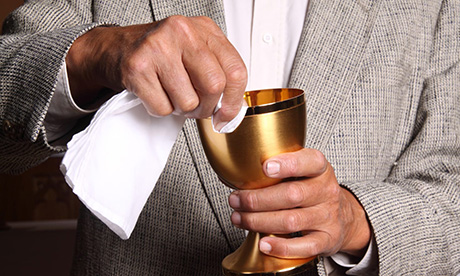Slowly, imperceptibly, we are leaving the Covid days behind us and a new reality is being born.
Weeks and months drifted by without the Eucharist and now we are waking up to a new dawn. Much has changed.
The familiar pattern of Eucharistic ministers waiting to offer each of us the cup at time of Communion seems a distant memory as we revert to previous practices and receive under only one form, with the cup reserved only for the priest-presider.
Maybe it is time to ask some questions in the light of changed ways, questions that challenge our very perception of what we are doing and why we are doing it.
Sharing the cup
We have been told to share a cup, one with another. This practice went directly against the social customs at the time of Jesus and in our times, as well.
For a group of friends to go into a coffee house and order one cup of coffee to share would not be acceptable. In the same way sharing a bottle of wine over dinner demands individual drinking glasses rather than a common cup passed from one to another round the table.
Yet this counter-cultural instruction is at the core of our Eucharistic belief. “Are you prepared to share this cup with me?”
Sharing a cup implies passing the cup from person to person with all the difficulties involved. For this reason, the nature of the goblet or chalice is inappropriate to the purpose we presently assign to them.
A container with two handles or “ears” would be more suitable, like the Ardagh Hoard that a group of boys discovered in Ireland in the mid-19th century. A cup needs to be designed for sharing in order to fulfil the common purpose that is indicated in the instruction given us by Jesus.
Thomas O’Loughlin, a frequent and popular contributor to La Croix International, has some good reflections on this.
Awkward questions don’t just go away
So much has changed since the first coronavirus lockdown. Just to go back to Mass without some reflection is not a realistic option. The resumption of a shared cup will hopefully not be delayed too long.
When the dust has settled, we will find that the scenery that surrounds us has indeed been altered.
Maybe one of the consequences of the long COVID-19 pandemic will be to make us re-examine much that we have taken for granted. The security we had become accustomed to continues to be challenged as we take the next steps in our personal pilgrimage of faith.
With change comes challenge, the discomfort of alteration, and the removal of the familiar with all the necessary accommodation that has to be made. Awkward questions don’t just go away by being ignored or trivialized.
Remember the words from one of Pete Seeger’s songs from the 1960s — “Where have all the flowers gone, long time passing, where have all the flowers gone, long time ago?”
I would suggest that, with the clearing of ground, a time of replanting is at hand, a time to fearlessly question the roots of our faith as we rake over the loose soil in preparation for new green shoots to come to fruition
- Chris McDonnell is a retired headteacher from England and a regular contributor to La Croix International.
- First published in La-Croix International. Republished with permission.
